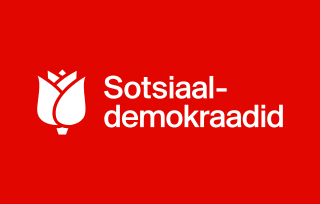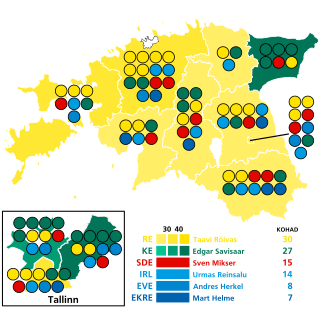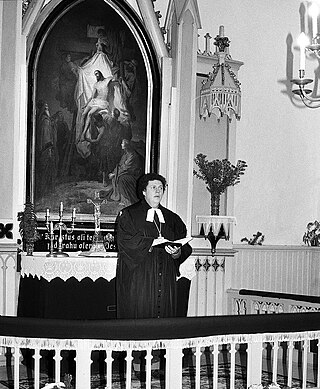
The Union for French Democracy was a centre-right political party in France. The UDF was founded in 1978 as an electoral alliance to support President Valéry Giscard d'Estaing in order to counterbalance the Gaullist preponderance over the political right in France. This name was chosen due to the title of Giscard d'Estaing's 1976 book, Démocratie française.

The People's Union of Estonia was a political party in Estonia. Its last leader was Margo Miljand.

The Estonian Reform Party is a liberal political party in Estonia. The party has been led by Kaja Kallas since 2018. It is colloquially known as the "Squirrel Party", referencing its logo.
Res Publica Party was a political party in Estonia that self-identified as conservative. Established as a party on 8 December 2001, the political organisation Res Publica was founded already as early as 1989 and existed as a community of young conservatives, mostly associated with the Pro Patria Union party during the 1990s. Res Publica was a member of the EPP on the European level. It merged with Pro Patria Union in 2006 to form the Pro Patria and Res Publica Union.
An electoral alliance is an association of political parties or individuals that exists solely to stand in elections.
A dominant-party system, or one-party dominant system, is a political occurrence in which a single political party continuously dominates election results over running opposition groups or parties. Any ruling party staying in power for more than one consecutive term may be considered a dominant party. Some dominant parties were called the natural governing party, given their length of time in power.

The Social Democratic Party is a centre-left political party in Estonia. It is currently led by Lauri Läänemets. The party was formerly known as the Moderate People's Party. The SDE has been a member of the Party of European Socialists since 16 May 2003 and was a member of the Socialist International from November 1990 to 2017. It is orientated towards the principles of social-democracy, and it supports Estonia's membership in the European Union. From April 2023, the party has been a junior coalition partner in the third Kallas government.
This article gives information on liberalism worldwide. It is an overview of parties that adhere to some form of liberalism and is therefore a list of liberal parties around the world.
This article gives an overview of liberalism and centrism in Estonia. It is limited to liberal and centrist parties with substantial support, mainly proved by having had a representation in parliament. The sign ⇒ denotes another party in that scheme. For inclusion in this scheme it is not necessary that the party has labeled itself as a liberal party.
The Pro Patria Union was a national-conservative political party in Estonia. The party was founded on 2 December 1995 from a merger of the Estonian National Independence Party and the Pro Patria National Coalition.

Parliamentary elections were held in Estonia on 7 March 1999. The newly elected 101 members of the 9th Riigikogu assembled at Toompea Castle in Tallinn within ten days of the election. The elections proved disastrous for the ruling Estonian Coalition Party, which won only seven seats together with two of its smaller allies. Following the elections, a coalition government was formed by Mart Laar of the Pro Patria Union, including the Reform Party and the Moderates. It remained in office until Laar resigned in December 2001, after the Reform Party had left the same governing coalition in Tallinn municipality, making opposition leader Edgar Savisaar new Mayor of Tallinn. The Reform Party and the Estonian Centre Party then formed a coalition government that lasted until the 2003 elections.
People's Party of Republicans and Conservatives was an Estonian political party, which existed under this banner from 1994 to 1998.

Isamaa is a Christian-democratic and national-conservative political party in Estonia.
The Christian People's Party was a political party in Estonia between 1919 and 1931.

Parliamentary elections were held in Estonia on 1 March 2015. Advance voting was held between 19 and 25 February with a turnout of 33 percent. The Reform Party remained the largest in the Riigikogu, winning 30 of the 101 seats. Its leader, Taavi Rõivas, remained Prime Minister. The newly elected 101 members of the 13th Riigikogu assembled at Toompea Castle in Tallinn within ten days of the election. Two political newcomers, the Free Party and the Conservative People's Party (EKRE) crossed the threshold to enter the Riigikogu.

Illar Hallaste was an Estonian cleric, politician, lawyer, and businessman, most notable for being a voter for the Estonian restoration of Independence.







